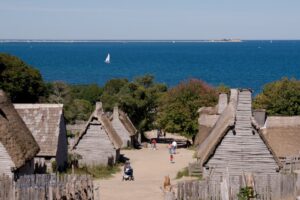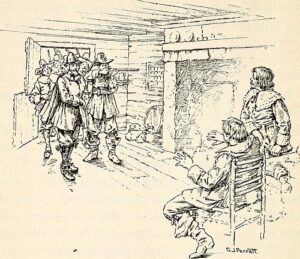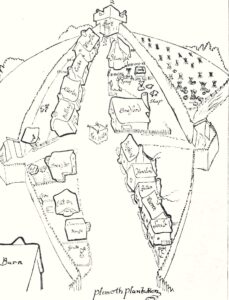by Col. John Eidsmoe, PRF Chairman, with Dr. Paul Jehle, PRF President

William Bradford closed out his commentary on the year 1625 with these words: “…it pleased the Lord to give the Plantation peace and health and contented minds, and so to bless their labors as they had corn sufficient, and some to spare to others.”
On the 9th of June in the same year, Bradford wrote to Robert Cushman that they had “never felt the sweetness of the country till this year.”
The year 1625 for the Pilgrims was another one of trials and conflict, but also a year of hope. Isaiah 61:3 promises “to give them beauty for ashes, the oil of joy for mourning, the garment of praise for the spirit of heaviness.” It was a promise of jubilee in the context of the ashes of their situation. Jude 3 exhorts us to “contend earnestly for the faith that was once delivered unto the saints.” The Pilgrims had to contend with at least three major areas of challenge in applying their faith in 1625.
The first was contending against erring brethren. The Lyford/Oldham controversy was not over yet. Oldham was banished but came back without permission. Bad behavior resumed; he expressed repentance but relapsed again. Bradford notes he went to Salem, and finally to Virginia where he died.
 The second challenge was contending against enemies of the Faith: Thomas Morton and Merrymount. Morton, an English lawyer and libertine, arrived in 1624 with 30 indentured servants, establishing Merrymount 40 miles north of Plimoth, near Quincy, MA. Though not culminating until 1627-1628, this settlement was the opposite of Plimoth in every way. They abolished all hierarchy and leadership. Alcohol flowed freely in Merrymount, and Bradford says they sold guns to the Indians.
The second challenge was contending against enemies of the Faith: Thomas Morton and Merrymount. Morton, an English lawyer and libertine, arrived in 1624 with 30 indentured servants, establishing Merrymount 40 miles north of Plimoth, near Quincy, MA. Though not culminating until 1627-1628, this settlement was the opposite of Plimoth in every way. They abolished all hierarchy and leadership. Alcohol flowed freely in Merrymount, and Bradford says they sold guns to the Indians.
Lyford was treated as an erring brother, but Morton as an enemy. Standish was sent to Merrymount, where he arrested Morton and sent him back to England. Back in England, Morton brought a lawsuit to have the charter of Massachusetts Bay Colony revoked, turning his legal brief into a book, the New English Canaan. The Pilgrims had a different response with each group: to Lyford, a gentle warning with opportunity for repentance; but to Mortin, strict orders, followed by military force.
But which is a greater danger – the enemy who stands outside the gate and threatens, or the heretic within who pretends to be an angel of light? False teachers today don’t carry signs saying “Beware!” They appear to be teaching orthodox doctrine, but are defining the terms differently and perhaps adding that we’re a little kinder and gentler than these strict old fundamentalists/Puritans/Pilgrims – and besides, we have some higher learning that puts a new light on things. This sounds attractive.
The third challenge was contending against secular business partners: The Merchant Adventurers. The basic agreement was that the Pilgrims would come and work, and the Adventurers would finance the colony and take a profit. The Adventurers did not necessarily care about the Pilgrim vision, but wanted them to succeed because they wanted to profit from their farming, fishing, fur trade, and other ventures. After going from communal farming to private enterprise, farming became profitable, but the other ventures did not make the big bucks the Merchant Adventurers were hoping for. By 1625, some of them began pulling out, and others, like James Sherley, died, so tensions between Pilgrims and the remaining Adventurers grew more severe.
Several attempts to pay their debts to the Merchant Adventurers met with disaster. One ship was captured by French privateers (pirates), and the furs seized. Another ship, the Little James, was captured by Muslims, the crew enslaved, and cargo seized. It vanished from history. This may have been the first American contact with Muslim nations, but certainly not the last. With debts unpaid and the Adventurers dissatisfied, they cut a deal. The Adventurers would sell shares at a loss to the Pilgrims for 1800 pounds, about $600,000 in today’s money. This was to be paid at 200 shares per year over 9 years. They did pay it back, but it took much longer than they expected.
The Pilgrims dealt with the Merchant Adventurers differently from the erring brother and the heathen enemy. They honored their agreement to the best of their ability, then cut a deal, but they kept their word.
We teach Pilgrim history to learn the Pilgrim vision, so we may apply it today. So what can we learn from Plimoth Plantation in the year 1625? We contend earnestly for the faith. We treat erring brothers with kindness, with gentle discipline, and with hope of restoration. We treat enemies of the faith with firmness, and if necessary, with force. We treat secular partners with respect and honorable dealing.
But how does God bring “beauty for ashes?” Ashes were a sign of mourning. Beauty is a sign of joy and triumph. Remember, Bradford wrote to Robert Cushman earlier in the year that they “never felt the sweetness of the country till this year.” Despite the adversity in England, difficulties in the Netherlands, and disasters in Plymouth from 1620-24, God was at work. He was working through the Pilgrims’ hard work, and His blessing was coming. The lessons?
 1. Trust in God, but work. There is no contradiction between waiting on the Lord and working (Isaiah 40:31). Revelation 14:13 states, “Blessed are the dead which die in the Lord from henceforth: Yea, saith the Spirit, that they may rest from their labours; and their works do follow them.” America’s prosperity is due to the free enterprise system based on a sound view of God’s laws and human nature. The Puritan/Pilgrim work ethic teaches the priesthood of all believers, and therefore holds that all labor is an exercise of ministry unto the Lord.
1. Trust in God, but work. There is no contradiction between waiting on the Lord and working (Isaiah 40:31). Revelation 14:13 states, “Blessed are the dead which die in the Lord from henceforth: Yea, saith the Spirit, that they may rest from their labours; and their works do follow them.” America’s prosperity is due to the free enterprise system based on a sound view of God’s laws and human nature. The Puritan/Pilgrim work ethic teaches the priesthood of all believers, and therefore holds that all labor is an exercise of ministry unto the Lord.
2. Delayed gratification. Work, save, forego early pleasures. Rather than dropping out of school and living idly, or getting a job for quicker income, stay in school and get that degree. There are many good reasons not to go to college today (most are nothing but partying and woke indoctrination), but the discipline of a good college and degree will open doors for your calling.
3. Practice humility and gratitude. Be thankful for what God has given you, including the ability to work and earn. “Ordinary people have big TV screens. Extraordinary people have big libraries.” A sign at the Maxwell Air Force Base says it well: “BEING GRATEFUL FOR WHAT YOU HAVE, MAKES WHAT YOU HAVE ENOUGH!”







